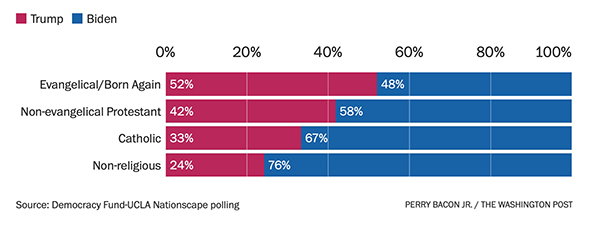

There has been a lot of noise lately about how minorities are moving toward the Republicans and woe be to the Democrats. Is this at all true? And if so, is it a real danger to the Democrats? Not so fast.
Yes, there has been a slight motion by minorities to the right in the past decade, but in some recent elections, they still favored the Democrats by over 35 points. That's not as good at 50%, but much better than 0%. And speaking of 50%, in the 2020 presidential election, Joe Biden got 73% of the minority vote to Donald Trump's 25%. That's a 48% gap in a major election. If 2020 had featured only Asian, Black, and Latino voters, Biden would have swept every state. Biden's margin was smaller than Barack Obama's, but he was both a member of a minority group and a remarkably gifted politician. Naturally, when he wasn't on the ballot, everything reverted to the status quo ante.
The voting patterns of Black, Asian, and Latino voters aren't the same. They are not interchangeable. Before 2008 and after 2012, Democrats got 85-90% of the Black vote. That appears stable. It is hard to say Black folks are deserting the blue team. And they are about 11% of the electorate.
Sometimes Asians vote for Republicans. They were split 50-50 between the parties in the 1990s, so their willingness to vote for Republicans is nothing new. But they are only 4% of the electorate and are a factor in only a small number of states.
The interesting story is the Latinos They are about 10% of the electorate, but a larger share in Arizona, Nevada, and Florida. The group typically gives 60% of its votes to the Democrats. That has been true for 30 years. There was one surprising result in a U.S. House district on the Mexican border a few years ago in which a Democratic district flipped, but one election in one Latino district does not a trend make.
Among white voters, certain patterns are very clear. People who have 4-year college degrees and people who are not Christians are very strongly Democratic. Other white demographics are moving rapidly to the Republicans. Among minority voters, the story is different, as education isn't the big dividing line. Some Latinos are conservative and drawn to the Republicans' pitch about family values. Also, minority voters who are skeptical of Black Lives Matters are more likely to vote Republican. Among Latinos, those who are Catholic or aren't religious are Democrats. Those who are born again are more likely to be Republicans. Here is a little chart based on the 2020 presidential election.

As you can see, religion was a huge factor among Latinos, but even in the reddest cohort, Democrats got 48% of the vote. The good news for Republicans is that while minority populations are growing, this will not create a voters-of-color giant that flips Texas and keeps Democrats in power forever. The bad news for the GOP is that minorities still favor Democrats and that is not likely to change soon. In close elections, this matters. (V)